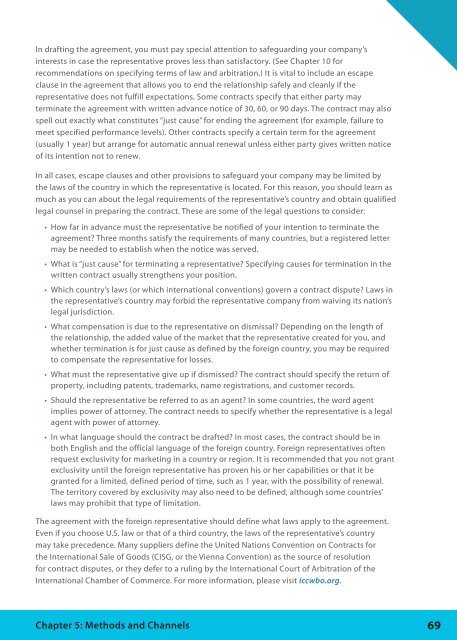basic-guide-to-exporting_Latest_eg_main_086196
basic-guide-to-exporting_Latest_eg_main_086196
basic-guide-to-exporting_Latest_eg_main_086196
You also want an ePaper? Increase the reach of your titles
YUMPU automatically turns print PDFs into web optimized ePapers that Google loves.
In drafting the agreement, you must pay special attention <strong>to</strong> saf<strong>eg</strong>uarding your company’sinterests in case the representative proves less than satisfac<strong>to</strong>ry. (See Chapter 10 forrecommendations on specifying terms of law and arbitration.) It is vital <strong>to</strong> include an escapeclause in the agreement that allows you <strong>to</strong> end the relationship safely and cleanly if therepresentative does not fulfill expectations. Some contracts specify that either party mayterminate the agreement with written advance notice of 30, 60, or 90 days. The contract may alsospell out exactly what constitutes “just cause” for ending the agreement (for example, failure <strong>to</strong>meet specified performance levels). Other contracts specify a certain term for the agreement(usually 1 year) but arrange for au<strong>to</strong>matic annual renewal unless either party gives written noticeof its intention not <strong>to</strong> renew.In all cases, escape clauses and other provisions <strong>to</strong> saf<strong>eg</strong>uard your company may be limited bythe laws of the country in which the representative is located. For this reason, you should learn asmuch as you can about the l<strong>eg</strong>al requirements of the representative’s country and obtain qualifiedl<strong>eg</strong>al counsel in preparing the contract. These are some of the l<strong>eg</strong>al questions <strong>to</strong> consider:• How far in advance must the representative be notified of your intention <strong>to</strong> terminate theagreement? Three months satisfy the requirements of many countries, but a r<strong>eg</strong>istered lettermay be needed <strong>to</strong> establish when the notice was served.• What is “just cause” for terminating a representative? Specifying causes for termination in thewritten contract usually strengthens your position.• Which country’s laws (or which international conventions) govern a contract dispute? Laws inthe representative’s country may forbid the representative company from waiving its nation’sl<strong>eg</strong>al jurisdiction.• What compensation is due <strong>to</strong> the representative on dismissal? Depending on the length ofthe relationship, the added value of the market that the representative created for you, andwhether termination is for just cause as defined by the foreign country, you may be required<strong>to</strong> compensate the representative for losses.• What must the representative give up if dismissed? The contract should specify the return ofproperty, including patents, trademarks, name r<strong>eg</strong>istrations, and cus<strong>to</strong>mer records.• Should the representative be referred <strong>to</strong> as an agent? In some countries, the word agentimplies power of at<strong>to</strong>rney. The contract needs <strong>to</strong> specify whether the representative is a l<strong>eg</strong>alagent with power of at<strong>to</strong>rney.• In what language should the contract be drafted? In most cases, the contract should be inboth English and the official language of the foreign country. Foreign representatives oftenrequest exclusivity for marketing in a country or r<strong>eg</strong>ion. It is recommended that you not grantexclusivity until the foreign representative has proven his or her capabilities or that it b<strong>eg</strong>ranted for a limited, defined period of time, such as 1 year, with the possibility of renewal.The terri<strong>to</strong>ry covered by exclusivity may also need <strong>to</strong> be defined, although some countries’laws may prohibit that type of limitation.The agreement with the foreign representative should define what laws apply <strong>to</strong> the agreement.Even if you choose U.S. law or that of a third country, the laws of the representative’s countrymay take precedence. Many suppliers define the United Nations Convention on Contracts forthe International Sale of Goods (CISG, or the Vienna Convention) as the source of resolutionfor contract disputes, or they defer <strong>to</strong> a ruling by the International Court of Arbitration of theInternational Chamber of Commerce. For more information, please visit iccwbo.org.Chapter 5: Methods and Channels69





